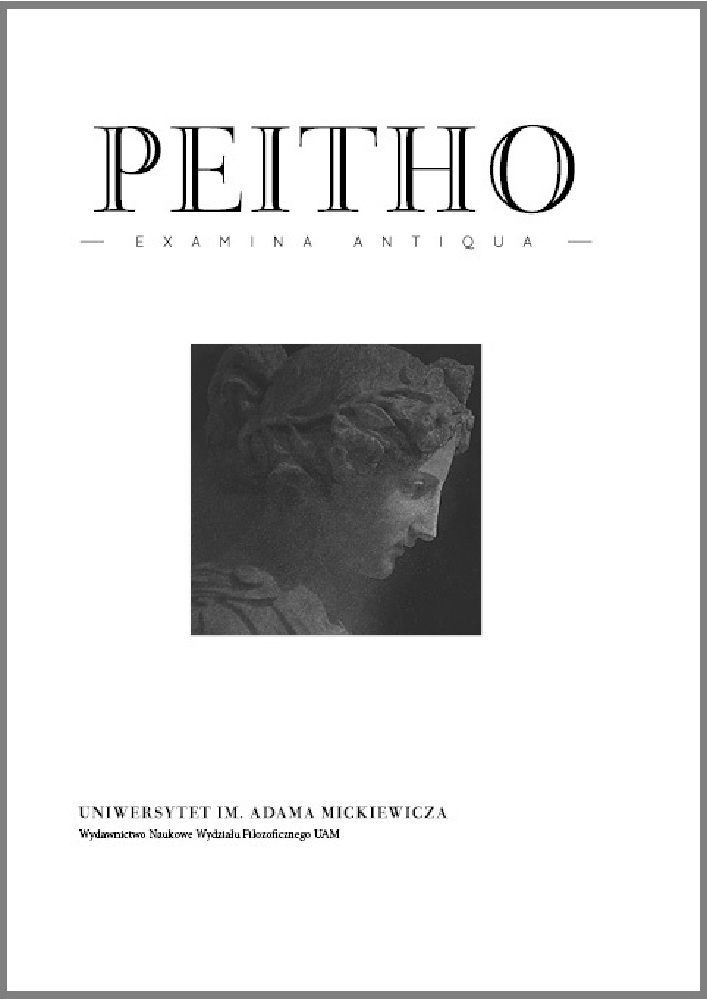Abstract
The present paper attempts to throw some light on the conundrum of Socrates’ political views in the Apology and Crito. The problem resides in that the Socrates of the Apology evidently undermines the authority of Athenian democracy, whereas the Socrates of the Crito argues that his escape from prison would be tantamount to disrespecting the state, which would in turn threaten the prosperity of the entire πόλις. The article suggests that in the two dialogues, the young Plato examines the possibility of steering a middle course between embracing relativism, on the one hand, and encouraging civil disobedience, on the other. Thus, the philosopher focuses primarily on investigating the two options, without either totally subordinating the citizen to the state, or unreflexively accepting any crude pragmatism.References
Barker, A., 1977, Why Did Socrates Refuse to Escape?, Phronesis 22 (1), pp. 13–28.
Benson, H.H., 2000, Socratic Wisdom: The Model of Knowledge in Plato’s Early Dialogues, Oxford, Oxford University Press.
Beversluis, J., 2000, Cross-Examining Socrates: A Defense of the Interlocutors in Plato’s Early Dialogues, Cambridge, Cambridge University Press.
Bobonich, C., 2008, Plato’s Politics, In G. Fine (ed.), The Oxford Handbook of Plato, Oxford, Oxford University Press, pp. 311–335.
Bostock, D., 1990, The Interpretation of Plato’s “Crito”, Phronesis 35 (1), pp. 1–20.
Brickhouse, T.C. and Smith N.D., 1994, Plato’s Socrates, Oxford, Oxford University Press.
Colson, D.D., 1985, On Appealing to Athenian Law to Justify Socrates’ Disobedience, Apeiron 19, pp. 133–151.
Colson, D.D., 1989, “Crito” 51 A–C: To What Does Socrates Owe Obedience?, Phronesis 34 (1), pp. 27–55.
Domaradzki, M., 2008, Plato’s Ambivalence about Rhetoric in the Gorgias, Eos 95 (1), pp. 19–31.
Dyson, M., 1978, The Structure of the Laws’ Speech in Plato’s Crito, The Classical Quarterly, 28 (2), pp. 427–436.
Erler, M. ,2007, Platon, In., H. Flashar (ed.), Grundriss der Geschichte der Philosophie. Begründet von Friedrich Ueberweg. Völlig neu bearbeitete Ausgabe. Die Philosophie der Antike, 2/2, Basel, Schwabe Verlag.
Gomme, A.W., 1958, The Structure of Plato’s ‘Crito’, Greece & Rome, 5 (1), pp. 45–51.
Greenberg, N.A., 1965, Socrates’ Choice in the Crito, Harvard Studies in Classical Philology, 70, pp. 45–82.
Grube, G.M.A., 1975, Plato: The Trial and Death of Socrates, Indianapolis, Hackett Publishing.
Jedan, C., 2010, Sokrates und die deliberative Demokratie. Zum sokratischen Politikverständnis in Platons
Apologie, Kriton und Gorgias, Peitho. Examina Antiqua 1, pp. 31–43.
Kahn, C.H., 1998, Plato and the Socratic Dialogue: The Philosophical Use of a Literary Form, Cambridge, Cambridge University Press.
Kierkegaard, S., 1989, The Concept of Irony with Continual Reference to Socrates, trans. H.V. Hong and E. Hong, Princeton, Princeton University Press.
Klosko, G., 2006, The Development of Plato’s Political Theory, Oxford, Oxford University Press.
Kraut, R., 1984, Socrates and the State, Princeton, Princeton University Press.
Miller, M., 1996, “The Arguments I Seem to Hear”: Argument and Irony in the “Crito”, Phronesis 41 (2),pp. 121–137.
Nails, D., 2009, The Trial and Death of Socrates, In, S. Ahbel-Rappe, and R. Kamtekar (eds.), A Companion to Socrates, Malden/Oxford, Wiley-Blackwell, pp. 5–20.
Penner, T., 1997, Two Notes on the Crito: The Impotence of the Many, and ‘Persuade or Obey’, The Classical Quarterly 47 (1), pp. 153–166.
Saccarelli, E., 2007, Alone in the World: The Existential Socrates in the Apology and Crito, Political Studies 55 (3), 522–545.
Sauvé Meyer, S., 2006, Plato on the Law, In., H. Benson (ed.), A Companion to Plato, Oxford, Blackwell, pp. 373–387.
Vlastos, G., 1974, Socrates On Political Obedience and Disobedience, Yale Review 63, pp. 517–534.
Vlastos, G., 1995, The Historical Socrates and Athenian Democracy, In: Gregory Vlastos: Socratic Studies, M. Burnyeat (red.), Cambridge, Cambridge University Press, pp. 87–108.
Wallace, R.W., 2011, Plato’s Socrates on Obeying the Laws of Democratic Athens, ΦΙΛΟΣΟΦΙΑ 41, pp. 87–97.
Weiss, R., 1998, Socrates Dissatisfied. An Analysis of Plato’s Crito, Oxford, Oxford University Press.
West, T.G. and West G.S., 1984, Four Texts on Socrates. Plato’s Euthyphro, Apology, and Crito and Aristophanes’ Clouds, Ithaca-London, Cornell University Press.
West, E.J.M., 1989, Socrates in the Crito: Patriot or Friend? In J.P. Anton & A. Preus (eds.), Essays in Ancient Greek Philosophy III. Plato, Albany, State University of New York Press, pp. 71–84.
Woodruff, P. , 2009, Socrates Among the Sophists, In, S. Ahbel-Rappe and R. Kamtekar (eds.), A Companion to Socrates, Malden/Oxford, Wiley-Blackwell, pp. 36–47.
Young, C.M., 2006, The Socratic Elenchus, In., H. Benson, (ed.), A Companion to Plato, Oxford, Blackwell, pp. 55–69.
Zuckert, C.H., 2009, Plato’s Philosophers. The Coherence of the Dialogues, Chicago, The University of Chicago Press.
License
Peitho provides immediate open access to its content on the principle that making research freely available to the public supports a greater global exchange of knowledge.
